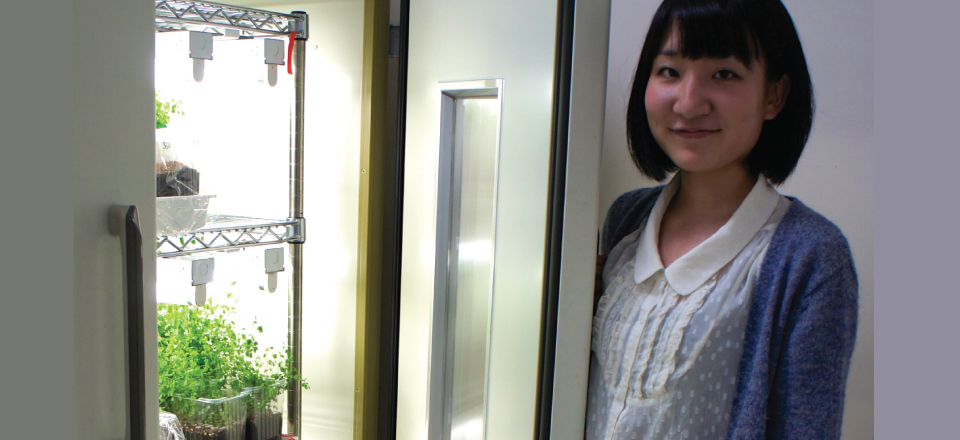Spotlight on Research #1: Locking-out Parasitic Worms in an International Lab
Research Highlight | May 23, 2013

When it came time to select a laboratory for her final undergraduate studies, Yu Hasegawa did not make an easy choice.
“I’ve wanted to study abroad for a long time,” she explains. “So when I had to choose a laboratory to join, I wanted to work with Derek.”
Professor Derek Goto moved to Japan from Australia and his laboratory, with its group of researchers heralding from Australia, Japan and Malaysia, is one of the most international in Hokkaido University.
Goto’s group is part of the School of Agriculture and its focus is a crop-destroying worm known as a root-knot nematode. The name is accurately descriptive; this minute parasite burrows into the roots of plants and sets up camp, creating a distinctive knotty bulbous growth around its new home. Such an infestation may kill younger seedlings and also decimates the adult plants to cause huge reductions in yield. Able to infect around 2000 different plant species, root-knot nematodes are single handedly responsible for about 5% of the global crop loss. In short, this is a serious world-wide problem.
With plans in mind to study outside Japan after graduation, Yu had practised English alone in addition to her agricultural studies. While it wasn’t always easy to understand what everyone was saying at first, Yu found she could generally follow the discussions of her new group. However, language was not the only change she had to deal with.
“In Japan,” Yu describes, “You have to remember facts from the textbook or you are shown how to do a task and then tested on this. Derek didn’t work like that; he would give me hints but I had to think for myself.”
This change in style was also what Yu was keen to experience when she joined Derek’s lab, but she admits it wasn’t easy.
“When I first came here, I was so confused. I was used to the Japanese style and I felt sad and angry. My friends in other laboratories were making progress on their projects but mine wasn’t going anywhere.”
Even with the help of the other members of the laboratory (who Yu describes as ‘awesome’) it took Yu four to five months to feel comfortable with her work.
While everyone in Derek’s group studies the problem of the root-knot nematode worms, each member investigates a different mechanism for stopping their destructive life cycle. Yu is examining what happens when the worm has infiltrated the root and starts to build its signature nest. In order to create the bulbous knots, the worm produces a secretion of compounds. This mix transforms the plant cells from their normal shape and function into enlarged giant cells with multiple nuclei in which their DNA is packaged. Not only are these inflated cells produced, but the cells surrounding them start to multiply, swiftly producing the knotted structure that signifies the infestation. Once transformed, the giant cells begin to suck nutrients away from the rest of the plant for the worm to gorge upon.
What Yu wants to know is which is the specific ingredient in the cocktail of compounds the worm secretes that causes the plant cells to transform. If the process could be broken down to a single biological key, then maybe a plant variation could be grown that was resilient to that one compound, effectively creating a locked door to the worm.
To investigate this possibility, Yu analyses the worm’s secretion and separates out of the mix a possible candidate for this cell deforming key. She then exposes a fresh batch of plant cells to only this single compound and watches how they develop.
Yu talks confidently about the complex procedures involved in her work and says that now, six months into her time in the laboratory, she does not feel her research is behind that of her peers.
“I think we are almost at the same level, and hopefully I can think more by myself so perhaps my ability to conduct experiments and convey my ideas efficiently in English and Japanese is better,” she adds, hesitantly.
After this year, Yu plans to pursue her dream of going abroad. She is currently applying to the Japanese Government for a scholarship to attend graduate school outside Japan. There is no denying that both in research and science communication, Yu had worked impressively hard to achieve this goal and we are excited to see what comes next for her.
Professor Derek Goto’s Laboratory
Author Dr Elizabeth Tasker
